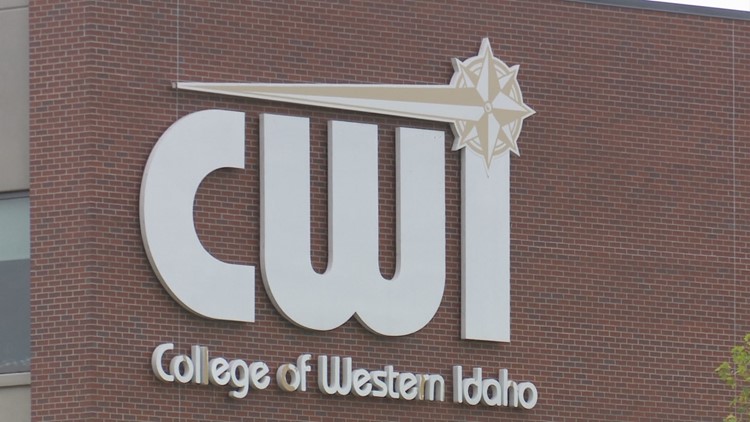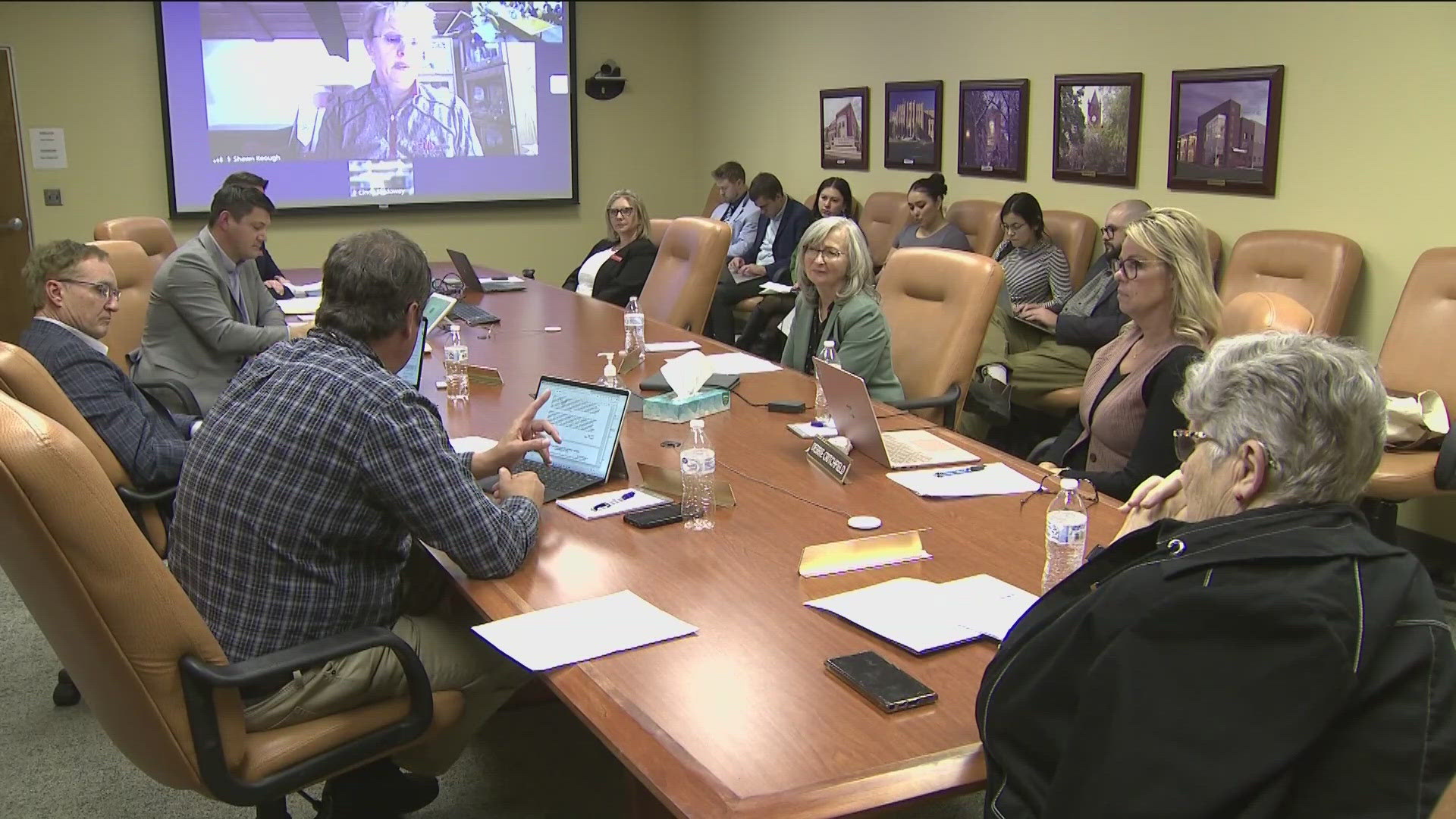BOISE, Idaho — This article originally appeared in the Idaho Press.
When the College of Western Idaho was established in 2007 — ending the Treasure Valley’s distinction as the largest metropolitan area in the nation without a community college — it was propelled by a groundswell of community support from Republicans, Democrats, Ada County, Canyon County, business leaders, educators, and prospective students.
That’s how more than two-thirds of voters in the two counties came to support starting the new community college.
“It just became this huge community effort,” said founding CWI board member Mark Dunham, who served on the board for almost 13 years before stepping down last year.
Now, as the college prepares to select the third college president in its history, it’s been reaching out to the community again, getting input from a wide array of voices on the four finalists it’s selected after a nationwide search that drew more than 70 applicants.
Last week, each of the four spent a full day on campus, interacting with students, faculty, staff, area businesses, stakeholder groups and more in half a dozen forums each day, some of which were broadcast live online. Hundreds took part.
“Last week was such an exciting week on campus,” said Molly Lenty, chair of the NIC board of trustees and also chair of the search committee for the new president. “The four finalists that we have are all extremely talented. … Any one of them have the capability of being a phenomenal president of a college.”
Here are the four finalists:
Denise Aberle-Cannata is the current CWI interim president, serving in the post since former longtime President Bert Glandon retired in May. She formerly was CWI’s provost and vice president for academic affairs. She’s also served as campus director for National American University in Colorado, which has 34 campuses; vice president for academic affairs at Weston Education in Denver, a 25-campus provider of allied health career education; and vice president of product development and distance education for Lincoln Technical Institute in New Jersey. She holds a master’s degree in education leadership from the University of North Dakota.
Gordon Jones is the founding dean of the College of Innovation + Design at Boise State University, a position he’s held since 2015. He previously served as Evans Family Foundation managing director for the Harvard Innovation Lab, also called the i-lab, which connects Harvard students to the business community in team-based, entrepreneurial startups. He also held executive positions with a series of large U.S. and international companies; and early in his career worked as a math teacher and coach in Arizona. He holds an MBA from the Stanford University School of Business.
Abby Lee is the current assistant majority leader of the Idaho Senate, where she’s serving her fourth term; and also has served as associate vice president of college and public relations for Treasure Valley Community College since 2007. She previously served as regional center director for Eastern Oregon University; and held positions in public information, public relations and journalism. She holds a master’s degree in instructional and performance technology from Boise State University, and will complete a Ph.D. in public policy and administration at BSU in May.
Todd Schwarz is the current provost, executive vice president and chief academic officer for the College of Southern Idaho, a position he’s held since 2014. He’s a former state administrator of professional-technical education; CSI dean and instructor; and drafter, designer and construction coordinator for an industrial package refrigeration manufacturer in Twin Falls. He holds a Ph.D. in education from the University of Idaho and a master’s degree in educational technology from BSU.
Lenty said the multiple forums on campus with the finalists – including a public forum with each that’s posted on YouTube – was designed for each of the finalists to get to know CWI stakeholders, and also for those groups to provide feedback on each of the hopefuls. In addition to submitting questions during the forums, participants filled out surveys, which are now being reviewed by the 15-member search committee.
Lenty said, “I think that level of engagement and level of transparency is so important, especially at the community college level, where we are so ingrained in the business community, the health care community, and have to be so.”
Dunham said CWI started as a community collaboration, and it’s tried to adhere to that vision all along.
“We had community leaders, we had education leaders from Boise State to school districts, we had citizens and legislators just saying, ‘It is time to have a community college,’” he said. “It certainly was a bipartisan, very successful effort, because it didn’t really matter which party you had – education was a compelling point for everybody.”
Then-Gov. Butch Otter was among the proposed new community college’s biggest cheerleaders. Dunham recalled Otter and then-Nampa Chamber of Commerce President MC Niland addressing a huge gathering at the Rose Room in Boise to launch the first fundraising push for the campaign.
Soon, some of the top Republican and Democratic political operatives in the state were working side by side, along with business and education interests, on reaching out to voters and urging them to back the new college. Ada County voters approved it by 71%, Canyon by 62%, and together that came to 68%, exceeding the required two-thirds margin.
It was Idaho’s first new community college district formed since the 1960s; at that point, Idaho had just two community colleges, CSI in Twin Falls and North Idaho College in Coeur d’Alene. Since then, it’s added the College of Eastern Idaho with approval of voters there.
Community colleges are two-year public colleges that provide affordable post-secondary education. They offer two-year associate degrees; transfer programs to universities and other higher education; along with workforce training and continuing education. Their hallmarks include open access and affordability, along with partnerships with local communities and businesses to match training to job needs in the area. In Idaho, community colleges are governed by locally elected boards, and receive support from local property taxes as well as some state funding.
Before CWI started up, Boise State University filled some of those needs through a technical college, but as BSU grew, it couldn’t promise the access and affordability for which community colleges are known.
CWI welcomed its first students in January of 2008 for certificate and non-credit classes, then began offering academic classes in January of 2009, to a student body of more than 1,200. It quickly became one of the fastest-growing community colleges in the nation, jumping to 3,600 students in its first six months. By 2010, it had 6,000.
Today, CWI serves nearly 30,000 students annually, including, according to 2020 enrollment figures, 21,539 credit students and 8,134 non-credit students. The figures include part-time, online and dual-enrollment students earning simultaneous high school credit. The “full-time equivalent” student tally in 2020 was 7,064.
“The growth is still happening,” Lenty said, “and opportunities for us to become more focused to make sure that the growth is happening in an area that the greatest workforce needs are, for today as well as tomorrow.”
Current programs and classes at CWI range from nursing to engineering and computer science to diesel technology and truck driving. There are courses in Spanish, surgical technology, welding and GED preparation. There’s chemistry, biology, bookkeeping and art.
Dunham said even after more than a dozen years on the college’s board, it still feels like a new college to him, and he’s excited about the quality of the presidential finalists.
“They have different backgrounds, different perspectives,” he said. “I just think any of them would really add to the success that we started years ago.”
Ashley Smith, CWI spokesman, said the CWI board will announce its selection for the college’s next president at its Dec. 9 meeting.
This article originally appeared in the Idaho Press, read more on IdahoPress.com
Watch more Local News:
See the latest news from around the Treasure Valley and the Gem State in our YouTube playlist:



